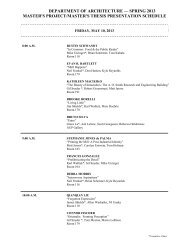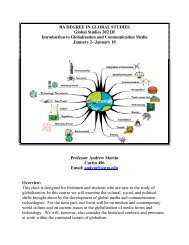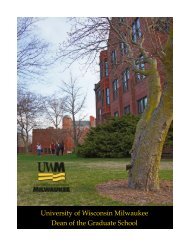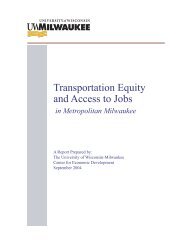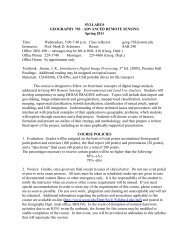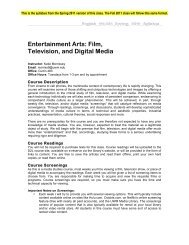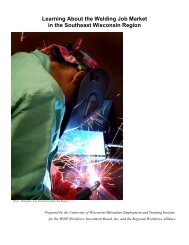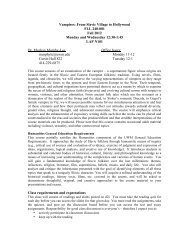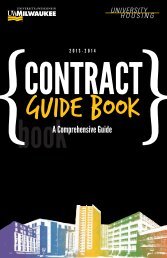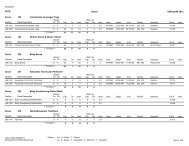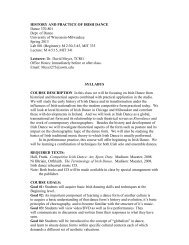Inside: - UW-Milwaukee
Inside: - UW-Milwaukee
Inside: - UW-Milwaukee
Create successful ePaper yourself
Turn your PDF publications into a flip-book with our unique Google optimized e-Paper software.
Bradley Distinguished Lecture Series<br />
Economist Hubbard Credits Sound Policy and<br />
Nature of American Economy for Its Resilience<br />
Glenn Hubbard<br />
In describing America’s strong<br />
economy to a <strong>Milwaukee</strong> audience<br />
recently, Glenn Hubbard used bold<br />
phrases such as “productivity miracle”<br />
and “growth revolution of the United<br />
States.” Hubbard is the former Chairman<br />
of the President’s Council of Economic<br />
Advisers (2001-03), and currently serves<br />
as Dean and Russell L. Carson Professor<br />
of Finance and Economics at the Columbia<br />
Business School.<br />
He spoke to the business community and<br />
Lubar School alumni at the Bradley<br />
Distinguished Lecture Series in early April.<br />
The series is co-sponsored by The Lynde<br />
and Harry Bradley Foundation and the<br />
Sheldon B. Lubar School of Business.<br />
“The American economy has performed<br />
extraordinarily well through a set of<br />
shocks that anybody would have called<br />
devastating, including investment collapse,<br />
equity market collapse, terrorism,<br />
accounting scandals, and geopolitical<br />
risks,” he said.<br />
Why is this? Hubbard credits both sound<br />
policy and the foundations of the American<br />
economy for its resilience.<br />
“Monetary policy plays a starring role in<br />
the U.S., both in cushioning the downturns<br />
and enhancing the upturns,” he stated.<br />
He also asserted that President Bush’s tax<br />
policy has had a signifi cant impact on the<br />
nation’s economic recovery.<br />
Still, Hubbard argued, too much focus is<br />
placed on policy developments, when<br />
much of our experience is due to the<br />
basic underpinnings of the American<br />
economy. “There is something about<br />
American institutions that matters a great<br />
deal,” he said.<br />
For example, he noted — because of the<br />
market for risk capital in the U.S. —<br />
“we’re able systematically to take funds<br />
and bring to market types of risks that are<br />
unheard of in much of the affl uent world.”<br />
He also pointed to the fact that the<br />
American labor system allows great<br />
fl exibility with how we allocate our talent<br />
— in this country and around the world.<br />
“But this long term success story is not<br />
manna from heaven,” he said. “It requires<br />
stewardship.”<br />
Though Hubbard is confi dent that<br />
economic recovery still has very much life<br />
and room to grow — projecting growth in<br />
the 2.5% to 3% range with substantial<br />
upside potential — he cautions against<br />
specifi c risks.<br />
These risks include infl ation, the “puzzlingly<br />
low” capital spending by business,<br />
and potential overregulation in capital<br />
markets.<br />
Hubbard is also concerned about the<br />
current level of protectionist sentiment in<br />
the U.S. “Never in my career have I seen<br />
such support on both sides of the aisle<br />
and from business leaders,” he stated. If<br />
this sentiment is translated into policy, he<br />
said, we run the risk of “derailing” the<br />
economy.<br />
“Competition from any source infl uences<br />
productivity growth and creates an<br />
incentive to innovate,” he concluded.<br />
“Trade matters.”<br />
In addition to his responsibilities at<br />
Columbia, Glenn Hubbard is a research<br />
associate at the National Bureau of<br />
Economic Research and a visiting scholar<br />
at the American Enterprise Institute in<br />
Washington. During his term as CEA<br />
Chairman, he chaired the Economic<br />
Policy Committee of the OECD. He was<br />
Deputy Assistant Secretary of the U.S.<br />
Treasury Department for Tax Policy from<br />
1991-93.<br />
SPRING 2007 5



